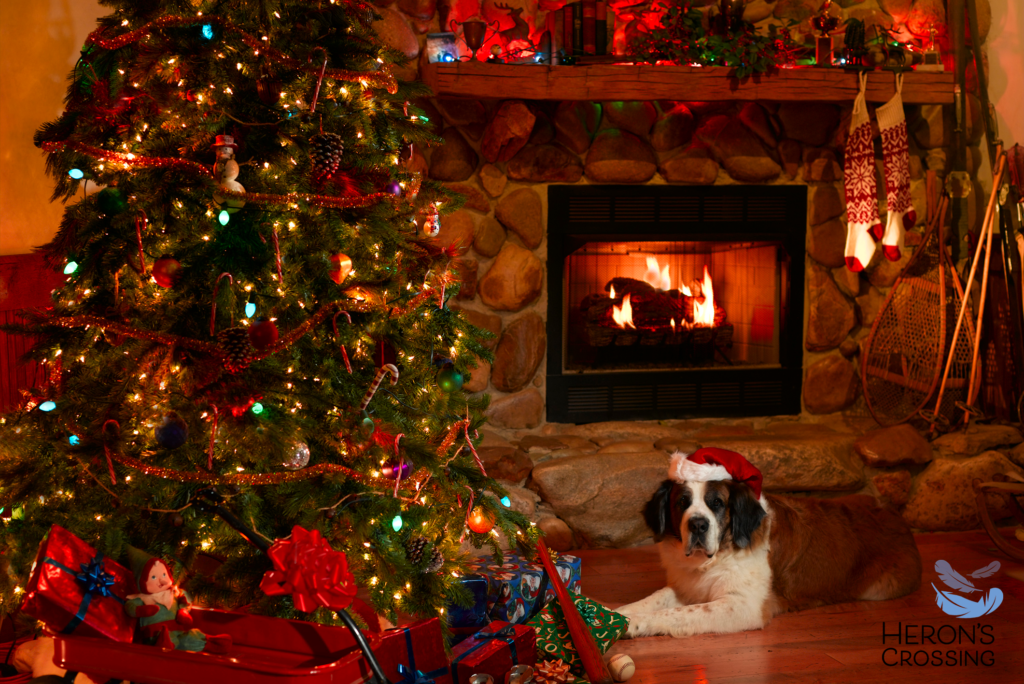While it may look beautiful to bring nature inside for the holidays, live decorations and floral arrangements can be dangerous or even deadly for dogs, so it is wise to make sure that indoor holiday decorative plants are pet-safe in case your dog is tempted to taste.
Chances are your florist or gardening store clerk won’t know which plants can affect your pets, so it’s up to you to keep them protected.
The list of flowers and greenery that are poisonous is amazingly large. Just about anything ‘Christmas-y’ is troubling. Poinsettias, holly, mistletoe, ivy, English yew, hydrangeas, chrysanthemums, lilies (anything from the lily family) and amaryllis can cause symptoms ranging from diarrhea and vomiting to convulsions, organ failure and even sudden death.
Although older dogs may show a bit more discretion, puppies are prone to chew on anything, including highly toxic mistletoe and holly berries that may fall on the floor from higher places. Their little bodies succumb to toxic substances quickly, so there may be no time to get help for them. Being a pro-active pet parent helps to make the home safe for everyone to have a happy holiday.
The ultimate reference guide to all plants, either poisonous or safe for animals, is compiled by the American Association for the Prevention of Cruelty to Animals. The ASCPA Toxic and Non-Toxic Plants List has search criteria that can be customized to list only toxic or non-toxic plants, for dogs, cats or horses. Other options let you choose a printable list to take shopping, or else type in a single name, or check the name alphabetically if you can’t spell it correctly.
A real Christmas tree may be something your dog would want to chew, and its tree stand is just another water bowl to him. Water in the stand can contain toxic ‘freshness’ additives, possible residual pesticides, sap, mold and bacteria. It’s safer to skip the additives and keep the tree stand covered and blocked from easy access.
A surprising online search reveals that at least 63% of commercial Christmas Trees are sprayed with pesticides. Possible alternatives are to locate places that sell cut or balled organic trees, to buy one locally at a farmer’s market, or to take a family day trip to visit an organic tree farm. Tree farms often have hayrides, warm cider and hot chocolate, and other things to do to enjoy the season.
The University of New Hampshire’s cooperative extension service has a short list of suggested safe holiday plants that include Christmas cactus, orchids, bromeliads, peperomia, roses, African violets and polka dot plants that bring vibrant color to holiday festivities without worries.
Christmas cactus, and to some degree, African violets, are living, potted plants that can thrive in sunny but cool places, and they will bloom during the winter. Other alternative plants such as everyday roses, camellias and orchids can fill the home with dazzling colors, but must be kept in warm, sunny places throughout the home.
Here’s to a happy and healthy holiday! But if pet ingestion problems come up, here are some resources to call for immediate advice:
ASPCA Animal Poison Control Center Phone Number: (888) 426-4435
https://www.aspca.org/pet-care/animal-poison-control
Georgia Poison Center24/7 Animal Poison Control: (855) 764-7661
https://www.petpoisonhelpline.com/
Please note: These hotlines have a per-incident fee similar to an office visit fee.
Heron’s Crossing provides end-of-life care for pets in the Metro Atlanta area. In-home appointments with compassionate vets are available. If you’d prefer a home-like setting away from your home, our Decatur office is also available by appointment.

